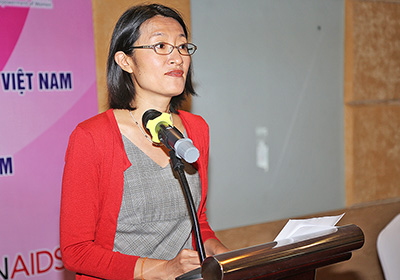Increased focus on women needed in National HIV response
Date:
[PRESS RELEASE]
Hanoi, Viet Nam – With women facing increased risks of HIV infection, leading experts are calling for greater emphasis on addressing the needs of women and girls in the national HIV response.
In 2014 an estimated 240,000 adults were living with HIV in Viet Nam. Although the number of new infections had stabilized at approximately 14,000 a year, the proportion of women living with HIV had increased from one in four in 2007 to one in three by 2014. More than half of women living with HIV involved in a 2010 study reported that their only possible exposure to HIV had been through a husband or long-term sex partner who had engaged in high-risk behaviour.

Addressing a 5-day workshop on the importance of mainstreaming gender into the national response to HIV, Ms. Shoko Ishikawa, UN Women Country Representative said “Women and girls living with HIV now face extraordinary, and often intersecting, forms of discrimination. Many face losing their home, custody of their children and property and inheritance rights. Women who engage in sex work also suffer high levels of discrimination. With an increasing proportion of new infections occurring among women it is now time to take serious action. Women’s participation in the AIDS response is critical and we need to develop HIV policies and programmes which especially address their particular experiences and needs”.
A recent gender assessment of the national HIV response and review of the monitoring and evaluation framework from a gender perspective highlighted a lack of gender knowledge and understanding amongst key stakeholders. This lack of knowledge has an impact on how the needs of women living with HIV are taken into account in planning and programming, with limited specific mention of gender in the draft HIV National Work Plan 2016-2020 and a lack of gender- and age- disaggregated data in HIV reporting. The response currently focuses heavily on pregnant women and the prevention of mother- to-child transmission, to the detriment of other vulnerable women and girls.
Mr.Pham Duc Manh, Deputy Director, Viet Nam Authority of HIV/AIDS Control (VAAC) says, “There is limited awareness and appropriate approaches to vulnerable women and girls and women and girls living with HIV at the moment. Only a very few existing indicators are women-focused, while the monitoring and monitoring and evaluation system focuses on quantitative data and case studies, which provided quite limited insights into the effects of the response on women and more generally, the quality and effectiveness of programmes. Together with the lack of gender knowledge, these are becoming major barriers to an effective national response to HIV”.
Sexual transmission is currently the most common means of transmission of HIV in Viet Nam, accounting for nearly half of all new infections in 2014, compared to 1 in 10 in 2000. At the same time, only 40% of young women have accurate knowledge about preventing the sexual transmission of HIV. Young women and girls also lack access to sexual and reproductive health services, putting many at greater risk of contracting HIV. It is important to work with these women, as studies show that with confidence, knowledge and support, women and girls can protect themselves and from infection.Across the world, responding to HIV and achieving gender equality are integral to the Sustainable Development Goals adopted in 2015, which provides a mandate for global collective action over the next 15 years. In June this year, the United Nations General Assembly adopted the 2016 Political Declaration on Ending AIDS, which set out the targets to be achieved by 2020 to end the AIDS epidemic by 2030 and which also emphasizes the importance of gender equality to the success of such efforts.
The Viet Nam Authority of HIV/AIDS Control is currently updating the HIV National Work Plan 2016 – 2020, as well as preparing the development of the 2017 Planning Guideline which will guide annual HIV work plans at the central and provincial levels for 2017. It is therefore crucial to ensure that gender priorities are reflected in national plans and other HIV programmes and policies now, in order to address gender gaps in the HIV response from 2017 and beyond. It is strongly recommended that the Government establish a strong legal and policy framework to eliminate discrimination against women who are living with HIV, and to effectively protect women who are at risk of infection, including by ensuring universal access to sexual and reproductive health services. Such a framework will be key to an efficient and effective implementation of HIV programmes nationwide.
The workshop led by Viet Nam Authority of HIV/AIDS Control, will run for five days, facilitated by experienced experts including HIV and gender Regional Advisors from UN Women and World Health Organisation, and supported by UNAIDS and FHI360 USAID/SHIFT.
For further information:
Please contact: Dang Huong Lan
Communications Consultant, UN Women
Mobile: 0983 66 7581
Email: [ Click to reveal ]
Note to editors
About UN Women
UN Women is the UN organization dedicated to gender equality and the empowerment of women. A global champion for women and girls, UN Women was established to accelerate progress on meeting their needs worldwide. UN Women supports Member States in setting global standards for achieving gender equality, and works with governments and civil society to design the laws, policies, programs and services required to implement these standards. UN Women stands behind women‘s equal participation in all aspects of life, focusing on the following five priority areas: increasing women’s leadership and participation; ending violence against women; engaging women in all aspects of peace and security processes; enhancing women’s economic empowerment and making gender equality central to national development planning and budgeting. UN Women also coordinates and promotes the UN systems works in advancing gender equality.